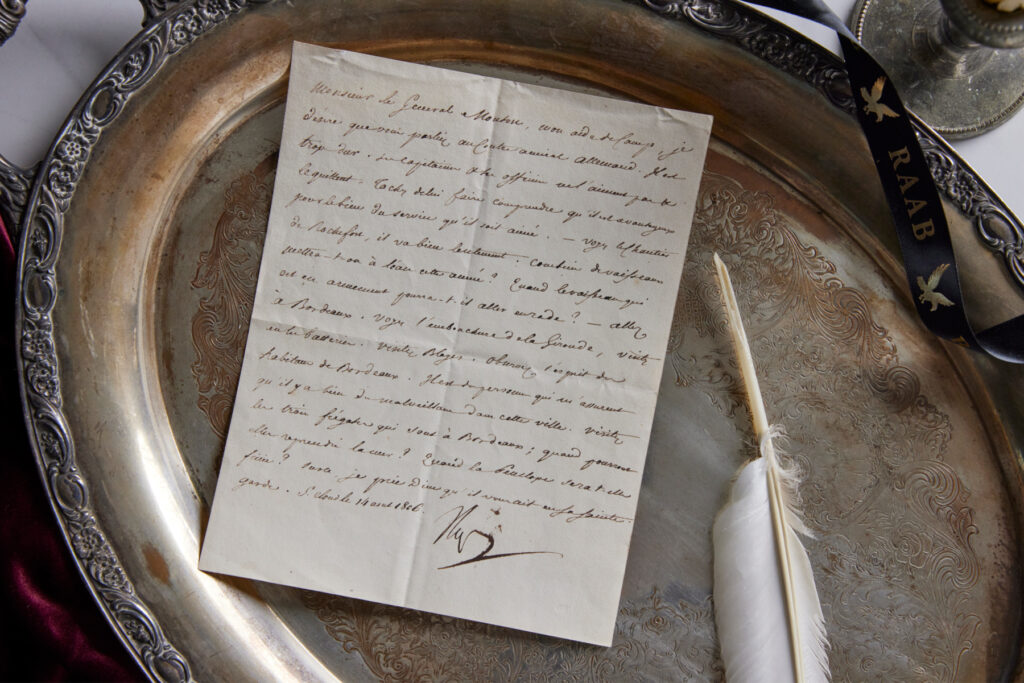Napoleon on the Defining Character of a Great Leader: “it is advantageous for the good of the service to be liked.”





A powerful and emblematic statement, the first we have seen, of the General and then Emperor who defined an era and earned the love of his fighting men
- Currency:
- USD
- GBP
- JPY
- EUR
- CNY
He aims to build back the Navy after the defeat of the Trafalgar Campaign and worries about saboteurs in Bordeaux
A letter never before offered for sale, acquired from the direct descendants of the recipient
Napoleon’s appeal to his men is legendary. More than almost any other person, he embodied...
He aims to build back the Navy after the defeat of the Trafalgar Campaign and worries about saboteurs in Bordeaux
A letter never before offered for sale, acquired from the direct descendants of the recipient
Napoleon’s appeal to his men is legendary. More than almost any other person, he embodied the nationalism of the 19th century; his soldiers revered him and for generations after he was studied for his populist leadership. He was a man of the people. Many books have been written on this subject, movies produced, tracking his magnetic and popular character. Ralph Waldo Emerson spoke for many when he wrote of Napoleon, in his essay focused on the General, “Among the eminent persons of the nineteenth century, Bonaparte is far the best known and the most powerful; and owes his predominance to the fidelity with which he expresses the tone of thought and belief, the aims of the masses of active and cultivated men.”
Zacharie Allemand was a French naval man who won great victories for Napoleon but did not endear himself to his superiors or the sailors under his command. After attacks in the Atlantic on British outposts, he returned to Brest, one of the main French naval ports and, upon his arrival there, he was relieved of duty for “brutality towards his crews” and “rudeness towards his passengers”. He was reinstated and eventually earned a larger command and operated a major Atlantic campaign as a diversionary affair to the Trafalgar campaign, which ended without the loss of a single ship in his fleet. This is now referred to as “Allemand’s expedition” of 1805. In spite of complaints against his character, he was made Rear Admiral in January 1806.
Napoleon was intent on laying low the British. His defeats at sea had made him all the more certain that the Atlantic venue must not be ignored. He had major ports for his fleet at Brest, Rochefort and the Gironde, in Bordeaux, where there were frigates under construction, among them the Penelope. The Battle of Trafalgar had seen the loss of 20 ships, more or less, and well over a thousand sailors. Napoleon was anxious to see a return to strength of his fleet.
General Mouton, the Count of Lobau, was a prominent general and later Marshall of the Empire for Napoleon. Mouton means “lamb” in French, the source of Napoleon’s now famous statement on Mouton: “My lamb is a lion.” Napoleon valued Mouton to the extent that for his great Russia campaign he made him senior aide de camp. In 1806 Mouton was a Brigade General. He would remain in Napoleon’s service until the end of the Empire, during which time he showed himself to be forthright, direct (“he’s no fawner”, Napoleon is noted to have said) but also disciplined, loyal, meticulous and highly organized. He was at Austerlitz with Napoleon and was charged with the preparation of the campaigns in Spain (1808), Russia (1812), Germany (1813) and Belgium (1815). Napoleon also wrote “Mouton is the best colonel to have ever commanded a French regiment.”
Letter signed, St. Cloud, August 14, 1806, to General Mouton, Compte de Lobau.
“General Mouton, I desire that you speak with Rear Admiral Allemand. He is too harsh. His captains and officers do not like him and they leave him. Attempt to make him understand that it is advantageous for the good of the service to be liked.
“Go see the site at Rochefort. Things go slowly there. How many vessels will we be able to send to sea this year? When will the vessel now in the armament (for fitting) be able to go to harbor?
“Go to Bordeaux. Examine the most of the Gironde and visit the batteries. Visit Blaye [up the river from Bordeaux]. Observe the spirit of the inhabitants of Bordeaux. I have heard from people who have assured me that there are malevolent actors in this town.
“Visit the three frigates which are in Bordeaux. When can we launch them to sea? The Penelope – when will she be completed?”
Never before offered for sale, acquired in the US from the direct descendants of the recipient residing in the states.

Frame, Display, Preserve
Each frame is custom constructed, using only proper museum archival materials. This includes:The finest frames, tailored to match the document you have chosen. These can period style, antiqued, gilded, wood, etc. Fabric mats, including silk and satin, as well as museum mat board with hand painted bevels. Attachment of the document to the matting to ensure its protection. This "hinging" is done according to archival standards. Protective "glass," or Tru Vue Optium Acrylic glazing, which is shatter resistant, 99% UV protective, and anti-reflective. You benefit from our decades of experience in designing and creating beautiful, compelling, and protective framed historical documents.
Learn more about our Framing Services















































































































